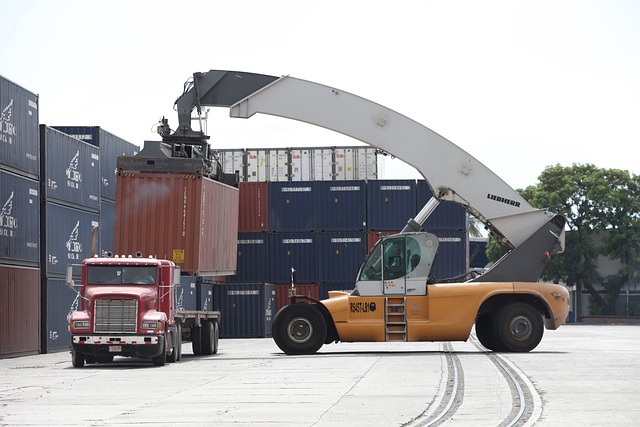The article examines the stringent environmental regulations impacting the lifecycle of truck batteries, from production to disposal. These regulations aim to reduce lead contamination and hazardous waste from heavy-duty batteries by mandating eco-friendly manufacturing practices, recycling standards, and safe disposal protocols. At the federal level, the Resource Conservation and Recovery Act (RCRA) guides the management of these batteries, with the Environmental Protection Agency (EPA) ensuring compliance. State initiatives like California's AB 2070 further these efforts by mandating recycling and establishing funding for responsible battery end-of-life management. The focus is on sustainable practices that depollute truck batteries, facilitate the recovery of reusable components through specialized recycling centers, and process hazardous materials to extract valuable substances. Compliance with environmental regulations is key to minimizing ecological damage and promoting sustainability in the trucking industry. The shift towards electric trucks powered by advanced battery technologies, such as lithium-ion and solid-state batteries, is driving the sector towards a more sustainable future, with an emphasis on high-performance, low-emission power sources and responsible lifecycle management to conserve resources and reduce waste. This transition signifies a critical step in the trucking industry's journey towards a lower carbon footprint, underscoring the importance of innovation and sustainability in transportation.
Navigating the complexities of environmental stewardship, the topic of regulations on truck battery impact emerges as a critical discussion in contemporary sustainable practices. This article delves into the pivotal measures governing the disposal and recycling of these batteries, shedding light on federal and state legislative frameworks that manage waste. It also explores innovative strategies in truck battery technology designed to minimize ecological footprints. Additionally, it outlines best practices for eco-conscious disposal, ensuring a comprehensive understanding of the environmental impact regulations in place. Join us as we explore the intricate landscape of regulations and technological advancements aimed at safeguarding our planet’s well-being.
- Understanding the Scope of Truck Battery Environmental Impact Regulations
- The Role of Federal and State Legislation in Managing Truck Battery Waste
- Best Practices for Eco-Friendly Disposal and Recycling of Truck Batteries
- Innovations in Truck Battery Technology to Mitigate Environmental Concerns
Understanding the Scope of Truck Battery Environmental Impact Regulations

In the realm of environmental protection, regulations governing the disposal and recycling of truck batteries have become increasingly stringent due to their significant environmental impact. These regulations are designed to mitigate the harmful effects that heavy-duty batteries can have on ecosystems, particularly concerning lead contamination and the proper handling of hazardous materials. The scope of these truck battery environmental impact regulations encompasses various aspects from manufacturing to end-of-life management. Manufacturers are required to adhere to standards that minimize the release of toxic substances during production and to design batteries with recycling in mind. Additionally, disposal sites must comply with regulations that ensure the safe decommissioning and processing of these batteries, preventing pollution and safeguarding public health. The environmental impact of truck batteries is a multifaceted issue, with regulations addressing not only the direct effects of their chemical composition but also the indirect impacts associated with their lifecycle, including resource extraction and energy consumption during operation. As such, these regulations are critical in promoting sustainable practices within the trucking industry and fostering a transition towards cleaner and more environmentally friendly energy solutions.
The Role of Federal and State Legislation in Managing Truck Battery Waste

The disposal and recycling of truck batteries present a significant environmental challenge due to their lead-acid composition, which can be hazardous if improperly handled. At the federal level, legislation such as the Resource Conservation and Recovery Act (RCRA) sets forth regulations for managing hazardous waste, including truck batteries. These regulations dictate proper disposal methods, aiming to prevent environmental contamination and protect public health. The Environmental Protection Agency (EPA), under RCRA guidelines, ensures that facilities handling battery waste adhere to stringent standards for storage, treatment, and disposal.
In parallel, state-level legislation complements the federal framework by tailoring regulations to local conditions and needs. States have established their own collection programs and recycling centers to manage truck battery waste effectively. California’s AB 2070, for instance, mandates recycling of batteries and aims to minimize environmental impact through a comprehensive recycling network. Similarly, state-specific laws often impose fees on new battery sales, funding the end-of-life management of these batteries. This dual approach of federal and state legislation ensures a robust system for managing truck battery waste, promoting responsible recycling practices and mitigating the environmental footprint associated with this critical component of the transportation industry.
Best Practices for Eco-Friendly Disposal and Recycling of Truck Batteries

When it comes to managing the environmental impact of truck batteries, eco-friendly disposal and recycling practices are paramount. As heavy-duty trucks play a critical role in transportation and logistics, their batteries, typically lead-acid types, require careful handling at end-of-life. The first step in responsible disposal is to ensure that batteries are properly depleted of charge to prevent electrical hazards during transport. Once depotentiated, the batteries should be transported to certified recycling facilities equipped with the necessary infrastructure to handle hazardous materials.
At these facilities, the recycling process begins by manually separating any accessible components like plastic cases and metals, which can be reused in new battery production. The remaining lead and sulfuric acid are processed through smelting and other chemical processes to recover valuable materials. These recovered materials are then purified and repurposed for use in new batteries or other industrial applications. It’s crucial for businesses and truck owners to adhere to local environmental regulations and guidelines for battery disposal, as these dictate the best practices for minimizing environmental harm and promoting sustainability within the industry. Proper recycling not only conserves natural resources but also mitigates the environmental footprint associated with the production and disposal of truck batteries. By implementing a robust recycling program and staying informed about regulatory changes, stakeholders can contribute to a greener future for transportation.
Innovations in Truck Battery Technology to Mitigate Environmental Concerns

Innovations in truck battery technology are pivotal in addressing environmental concerns associated with heavy-duty transportation. The transportation sector is a significant contributor to greenhouse gas emissions and air pollution, primarily due to fossil fuel combustion in diesel engines. In response, the industry has seen a surge in the development of advanced electric truck batteries. These state-of-the-art batteries are designed to be more energy dense and efficient, allowing for longer ranges and reduced reliance on internal combustion engines. The integration of these high-capacity batteries into commercial vehicles not only minimizes direct emissions but also promotes a cleaner, more sustainable supply chain. Manufacturers are investing in lithium-ion and other emerging battery technologies, such as solid-state batteries, which promise even greater energy density and safer operation with less environmental impact. Additionally, the lifecycle of these batteries is being optimized to ensure they can be effectively recycled at the end of their service life, thus minimizing waste and conserving natural resources. These advancements underscore a commitment to sustainable transportation and represent a critical step in mitigating the environmental footprint of the trucking industry.
In conclusion, the regulations surrounding the environmental impact of truck batteries are a critical component in safeguarding our ecosystems. The interplay between federal and state legislation underscores the importance of a comprehensive approach to managing the waste generated from these batteries. Best practices for eco-friendly disposal and recycling are not only beneficial but also mandated, highlighting the industry’s commitment to sustainability. Furthermore, advancements in truck battery technology offer promising solutions to mitigate potential environmental concerns, paving the way for a greener future. Stakeholders across the board must collaborate to implement these regulations effectively and embrace innovations to ensure the long-term viability of transportation systems with minimal ecological footprint.



